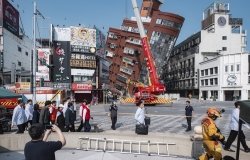George W. Bush and Asia: A Midterm Assessment
James A. Kelly, Assistant Secretary of State for East Asian and Pacific Affairs; Xiaoyuan Liu, associate professor of history, Iowa State, and WWC/GWU Asian Policy Studies Fellow; Catharin Dalpino, fellow, Brookings Institution; Jonathan Pollack, director, Strategic Research Department, US Naval War College; Harry Harding, dean, Elliot School of International Affairs, George Washington University; Kurt Campbell, senior vice president, Center for Strategic and International Studies; Katharine H.S. Moon, associate professor of political science, Wellesley College, and WWC/GWU Asian Policy Studies Fellow; Hilton Root, senior fellow, Economic Strategy Institute; Nayan Chanda, director of publications, Yale Center for the Study of Globalization; Frank S. Jannuzi, professional staff, Senate Foreign Relations CommitteeDownload "George W. Bush and Asia: A Midterm Assessment" Conference Report
Overview
Read the conference papers in PDF format
James A. Kelly, Assistant Secretary of State for East Asian and Pacific Affairs; Xiaoyuan Liu, associate professor of history, Iowa State, and WWC/GWU Asian Policy Studies Fellow; Catharin Dalpino, fellow, Brookings Institution; Jonathan Pollack, director, Strategic Research Department, US Naval War College; Harry Harding, dean, Elliot School of International Affairs, George Washington University; Kurt Campbell, senior vice president, Center for Strategic and International Studies; Katharine H.S. Moon, associate professor of political science, Wellesley College, and WWC/GWU Asian Policy Studies Fellow; Hilton Root, senior fellow, Economic Strategy Institute; Nayan Chanda, director of publications, Yale Center for the Study of Globalization; Frank S. Jannuzi, professional staff, Senate Foreign Relations Committee
The midpoint of George W. Bush’s presidential term offers an opportune moment to take stock of the administration’s Asia policy. What is the administration’s vision of Asia? How does it conceptualize American interests in the region and the U.S. role in Asia? What have been the defining characteristics of the administration’s policy toward Asia? Its principal achievements? Its shortcomings? To what extent have the horrific events of Sept. 11, 2001 shaped, dominated, or skewed the administration’s approach to the region?
The Asia Program hosted a day-long conference on December 11 to explore these and related questions. Keynote speaker James A. Kelly, assistant secretary of state for East Asian and Pacific affairs, gave an overview of the Bush administration’s “Asiaview,” focusing on terrorism, the Korean peninsula, and ASEAN (Association of Southeast Asian Nations). The events of the past two years, Kelly declared, have fostered “a new determination to lead abroad -- in Asia and throughout the world.”
Other conference speakers focused on specific aspects of the administration’s overall approach to Asia, but failed to agree among themselves as to what this new determination to lead has actually meant. There was, perhaps surprisingly (given the amount of press comment on the topic), relatively little talk about American “unilateralism” in the conduct of its Asia policy. Several speakers did note, however, that Bush’s policies in Asia have demonstrated very little of the “humility” candidate Bush had promised during the presidential campaign two years ago. Was Sept. 11 a “transforming event” for American policy in Asia? Conference speakers were of several minds on this question. But they were far more united on another matter: again contrary to expectations held by both supporters and critics of the administration, rhetoric about China as a threat to crucial U.S. security interests has largely disappeared, at least for the present. To the contrary, the relationship Bush has forged with the PRC enjoys a momentary stability that few would have predicted two years ago.
Robert M. Hathaway
Director, Asia Program
Documents & Downloads
Hosted By

Indo-Pacific Program
The Indo-Pacific Program promotes policy debate and intellectual discussions on US interests in the Asia-Pacific as well as political, economic, security, and social issues relating to the world’s most populous and economically dynamic region. Read more
Thank you for your interest in this event. Please send any feedback or questions to our Events staff.










